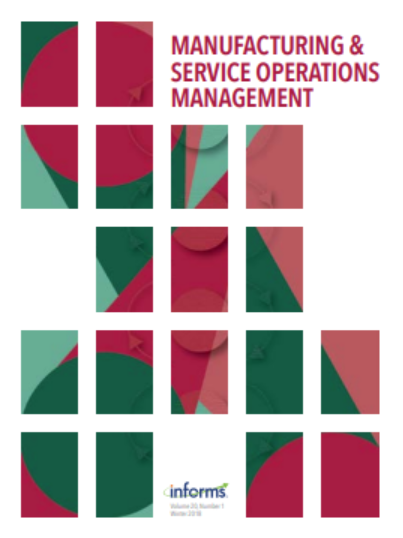Off-Platform Threats in On-Demand Services
IF 4.8
3区 管理学
Q1 MANAGEMENT
M&som-Manufacturing & Service Operations Management
Pub Date : 2023-03-01
DOI:10.1287/msom.2022.1179
引用次数: 0
Abstract
Problem definition: Online platforms that provide on-demand services are often threatened by the phenomenon of leakage, where customer-provider pairs may decide to transact “off-platform” to avoid paying commissions to the platform. This paper investigates properties of services that make them vulnerable or resistant to leakage. Academic/practical relevance: In practice, much attention has been given to platform leakage, with platforms experimenting with multiple approaches to alleviate leakage and maintain their customer and provider bases. Yet, there is a current dearth of studies in the operations literature that systematically analyze the key factors behind platform leakage. Our work fills this gap and answers practical questions regarding the sustainability of platform. Methodology: We develop two game-theoretical models that capture service providers’ and customers’ decisions whether to conduct transactions on or off the platform. In the first (“perfect information”) model, we assume that customers are equipped with information to select their desired providers on the platform, whereas in the second (“imperfect information”) model, we assume customers are randomly matched with available providers by the platform. Results: For profit maximizing platforms, we show that leakage occurs if and only if the value of the counterparty risk from off-platform transactions exceeds a threshold. Across both models, platforms tend to be more immunized against leakage as provider pool sizes increase, customer valuations for service increase, their waiting costs decrease, or variability in service times are reduced. Finally, by comparing the degree of leakage between both settings, we find that neither model dominates the other across all parameter combinations. Managerial implications: Our results provide guidance to existing platform managers or entrepreneurs who are considering “platforming” their services. Namely, based on a few key features of the operating environment, managers can assess the severity of the threat of platform leakage for their specific business context. Our results also suggest how redesigning the waiting process, reducing service time variability, upskilling providers can reduce the threat of leakage. They also suggest the conditions under which revealing provider quality information to customers can help to curb leakage. Funding: J. Goh’s work was supported by a National University of Singapore Start-Up [Grant R-314-000-110-133] and a 2021 Humanities and Social Sciences Fellowship from the National University of Singapore. Supplemental Material: The online appendices are available at https://doi.org/10.1287/msom.2022.1179 .按需服务中的平台外威胁
问题定义:提供按需服务的在线平台经常受到泄漏现象的威胁,客户-供应商对可能会决定进行“场外”交易,以避免向平台支付佣金。本文研究使服务易受泄漏或抵抗泄漏的属性。学术/实践相关性:在实践中,人们对平台泄漏给予了很大的关注,平台尝试了多种方法来减轻泄漏并维护其客户和提供商基础。然而,目前运营文献中缺乏系统分析平台泄漏背后关键因素的研究。我们的工作填补了这一空白,并回答了有关平台可持续性的实际问题。方法论:我们开发了两个博弈论模型,捕捉服务提供商和客户是否在平台上进行交易的决定。在第一个(“完全信息”)模型中,我们假设客户有信息来选择他们想要的平台供应商,而在第二个(“不完全信息”)模型中,我们假设客户是由平台随机匹配到可用的供应商的。结果:对于利润最大化平台,我们表明,当且仅当场外交易的交易对手风险价值超过阈值时,泄漏才会发生。在这两种模式中,随着提供商池规模的增加、客户对服务的估值的增加、等待成本的降低或服务时间的可变性的减少,平台往往更容易免受泄漏的影响。最后,通过比较两种设置之间的泄漏程度,我们发现在所有参数组合中,任何一个模型都不优于另一个模型。管理启示:我们的研究结果为现有的平台管理者或正在考虑将其服务“平台化”的企业家提供了指导。也就是说,基于操作环境的几个关键特征,管理人员可以针对其特定的业务环境评估平台泄漏威胁的严重程度。我们的研究结果还表明,如何重新设计等待过程,减少服务时间的变化,提高供应商的技能,可以减少泄漏的威胁。他们还提出了向客户披露供应商质量信息有助于遏制泄漏的条件。资助:J. Goh的工作得到了新加坡国立大学创业基金(Grant r - 314000 -110-133)和新加坡国立大学2021年人文社会科学奖学金的支持。补充材料:在线附录可在https://doi.org/10.1287/msom.2022.1179上获得。
本文章由计算机程序翻译,如有差异,请以英文原文为准。
求助全文
约1分钟内获得全文
求助全文
来源期刊

M&som-Manufacturing & Service Operations Management
管理科学-运筹学与管理科学
CiteScore
9.30
自引率
12.70%
发文量
184
审稿时长
12 months
期刊介绍:
M&SOM is the INFORMS journal for operations management. The purpose of the journal is to publish high-impact manuscripts that report relevant research on important problems in operations management (OM). The field of OM is the study of the innovative or traditional processes for the design, procurement, production, delivery, and recovery of goods and services. OM research entails the control, planning, design, and improvement of these processes. This research can be prescriptive, descriptive, or predictive; however, the intent of the research is ultimately to develop some form of enduring knowledge that can lead to more efficient or effective processes for the creation and delivery of goods and services.
M&SOM encourages a variety of methodological approaches to OM research; papers may be theoretical or empirical, analytical or computational, and may be based on a range of established research disciplines. M&SOM encourages contributions in OM across the full spectrum of decision making: strategic, tactical, and operational. Furthermore, the journal supports research that examines pertinent issues at the interfaces between OM and other functional areas.
 求助内容:
求助内容: 应助结果提醒方式:
应助结果提醒方式:


